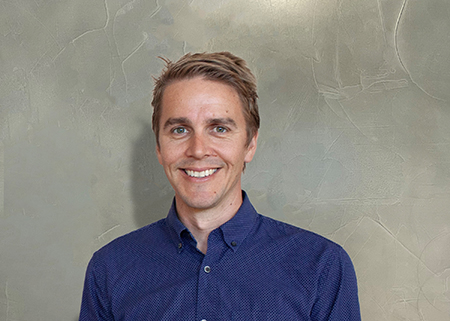On the lighter side of things, we ask Scott Willson, CEO, Forbury, about what makes him tick.
What would you describe as your most memorable experience?
Building a great team. Yes, it sounds like a cliché but, as a co-founder, getting a group of people to align around a vision is hard. If you don’t hire the right people, or there’s someone who’s fundamentally misaligned with the values of the organization, working through that can be challenging, for a small business. We’re really fortunate to have 24 high achieving individuals who know how to work together – and who genuinely come to work each day focused on Forbury’s goals and objectives. Luck has probably played a big part but nevertheless, it’s something that makes me proud.

What first made you think of a career in technology?
Growing up, my parents encouraged my sister and me to learn about computers but, although I was interested enough, technology wasn’t really a focus for me as a young person. I spent a decade in various business and corporate roles before the ICT sector ‘claimed’ me in 2013. It was around that time SaaS businesses like Xero were starting to make their mark and I became aware of the very obvious intersection between technology and business – the way it could be harnessed to solve problems and make a real difference to performance.
What style of management philosophy do you employ with your current position?
A few years ago, I watched a presentation by Netflix’s management team, talking about the way in which the company drives a culture of achievement. They discussed the concept of ‘highly aligned and loosely coupled’. The idea is that everyone is on the same page regarding the company’s strategic direction and, at the same time, they’re trusted to know what they need to do and how they should spend their time to best benefit the company. It really resonated with me and I’ve tried to put it into practice as we’ve expanded.
What do you think is the current hot technology talking point?
Uptake of cloud technology is really starting to gather pace in the property industry (at last!). Large businesses which traditionally used enterprise software are now being presented with opportunities and options for taking a more fragmented approach to technology adoption. Meanwhile, on the consumer front, the tokenisation of artwork seems to have suddenly become a thing. I’m fascinated that people can create these digital works and someone will pay for the ownership of them.
How do you deal with stress and unwind outside the office?
I like to put a positive spin on stress. Often, the reason I’m stressed is because I have to deal with something new and I’m not sure how to approach it. Reframing it as an academic and emotional challenge helps me put it into perspective. After a really big week, I like to unwind by doing something off piste – taking my family away, going on hikes, riding bikes and just being silly with the kids. Music is another outlet. In my younger days, I played in a band and during lockdown last year I started having trumpet lessons. I was pretty bad to begin with but I’ve been practising for 15 minutes a night and I’m now a bit more listenable.
If you could go back and change one career decision, what would it be?
This is a hard one. I worked in the resources sector for three years and I certainly don’t regret the connections I made – it’s where I met Steve Surridge and Pete Rose who are both directors of Forbury – but, from an ethical perspective, I probably didn’t think about it enough at the time. When my kids are older, I’m going to have a tough time explaining why I put three years of energy and effort into promoting the interests of a coal company that was indirectly responsible for generating a huge amount of CO2. It’s not really in line with my values.
What do you currently identify as the major areas of investment in your industry?
For SaaS companies like ours, there are several: security; people and culture; market expansion; and marketing. We’re trying to achieve our strategic growth ambitions across different time zones and places of work, and creating the right sort of environment for the people who work in the business is key to our growth and success.
What are the region specific challenges when implementing new technology in APAC?
Aversion to change is the biggest one we face. Property is a conservative industry and people are not always aware of what’s possible. The prevailing mindset tends to be ‘if it ain’t broke, don’t fix it’. Outside of Australia and New Zealand, establishing trust is a big thing too. Asian companies generally won’t contemplate change, unless it’s with a partner that’s known to them. Fortunately for us, New Zealand Trade and Enterprise have been really helpful. They have some excellent people and resources in situ to help small players like us connect with local businesses we can work with.
What changes to your job role have you seen in the last year and how do you see these developing in the next 12 months?
We’ve added 10 people in the last 12 months, taking our headcount to 24. As a result, I’ve handed on a lot of day-to-day responsibilities. My involvement in sales is limited to newer markets and really big deals, and on the development side we now have a team of experts who know better than I do how to optimize and expand our offering. Our UK launch is scheduled for late April and I’ll be keeping a close eye on early results over there. If things go as well as we expect, we’ll be getting ready to push the button on our next market, the US.
What advice would you offer somebody aspiring to obtain a C-level position in your industry?
Do it from a founding position. Team up with someone else so you can share the risk and bounce ideas off one another, and work towards the point where there is a C level role for each of you! If you’re joining a smaller, fast growth company with the aim of working your way to the top, be realistic about the level of effort that’s required. In companies with fewer than 50 employees, there is no downtime because there is so much work to do and everyone in the business needs to contribute to the outcome. That means being prepared to give it 110%, every single day.
Click below to share this article

